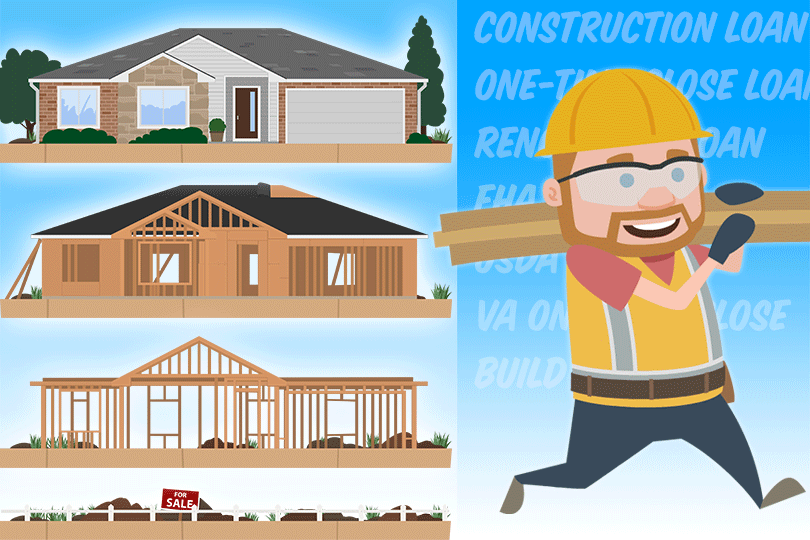FHA Home Loans for Existing Construction, New Construction, Proposed Construction

Do you want to build a home on your own lot from the ground up? That’s the job of an FHA One-Time Close construction loan, which differs from the type of FHA mortgage you need to buy an existing property.
And that’s one of the issues with any type of mortgage. Your choices don’t end at purchasing a house in the burbs, a manufactured home, or a condo unit. Some borrowers have strong feelings about buying certain properties; they may not want to live in a home built for or occupied by someone else.
These borrowers will be looking at their One-Time Close construction loan options, or they may consider buying a house built recently but never occupied.
In that scenario, the borrower is said to be considering their options for either a construction loan or a New Construction loan, which the FHA Lenders Handbook, HUD 4000.1 describes as follows:
“New Construction refers to Proposed Construction, Properties Under Construction, and Properties Existing Less Than One Year,” which means the property has never been sold and occupied by a buyer.
Existing Less Than One Year is different from the standard “existing construction” definition; existing construction may or may not have been occupied, but property Existing Less Than One Year refers to a property that has not been purchased or occupied since its completion less than one year from being completed.
Why do we focus on whether a home is existing construction, proposed construction, or a property that has only existed a year or less?
A Yahoo! Finance article from May 20, 2023, notes that in the current mortgage market, some borrowers are finding deals purchasing recently built homes that have never been occupied.
From the article:
"While the average mortgage rate remains stuck above 6%, buyers of new homes are getting a much better deal, with borrowers buying homes far below the mortgage rate reported at the time this article was written; 6.5%."
According to Yahoo! Finance, current house hunters looking at homes existing less than one year are "...not paying 6.5% — the headline rate," according to the article. Those buying homes that have existed for a year or less may pay around 5% instead.
Should YOU consider a home that was built in the last year because of the interest rate savings? That may depend on your FICO scores since they will be used partly to help determine the interest rate offered to you. Yes, you should explore your options for buying a recently constructed home.
But if your FICO scores aren’t high enough to qualify you for that much lower interest rate, you should consider other home loan types (existing construction, condo loans, manufactured home loans) that may have more to offer you in your current circumstances.
 FHA, VA, and USDA: One-Time Close Loans
FHA, VA, and USDA: One-Time Close Loans
Want More Information About One-Time Close Loans?
We have done extensive research on the FHA (Federal Housing Administration) and the VA (Department of Veterans Affairs) One-Time Close Construction loan programs. We have spoken directly to licensed lenders that originate these residential loan types in most states and each company has supplied us the guidelines for their products. We can connect you with mortgage loan officers who work for lenders that know the product well and have consistently provided quality service. If you are interested in being contacted by a licensed lender in your area, please send responses to the questions below. All information is treated confidentially.
FHA.com provides information and connects consumers to qualified One-Time Close lenders to raise awareness about this loan product and to help consumers receive higher quality service. We are not paid for endorsing or recommending the lenders or loan originators and do not otherwise benefit from doing so. Consumers should shop for mortgage services and compare their options before agreeing to proceed.
Please note that investor guidelines for the FHA and VA One-Time Close Construction Program only allows for single family dwellings (1 unit) – and NOT for multi-family units (no duplexes, triplexes or fourplexes). In addition, the following homes/building styles are not allowed under these programs, including but not limited to: Kit Homes, Barndominiums, Log Cabin Homes, Shipping Container Homes, Stilt Homes, Solar (only) or Wind Powered (only) Homes, Dome Homes, Bermed Earth Sheltered Homes, Tiny Homes, Accessory Dwelling Units, or A-Framed Homes.
Contact Us: Send Us Your Request – Spam Safe
Please send your email request to [email protected] which authorizes FHA.com to share your personal information with one mortgage lender licensed in your area to contact you.
1. Send your first and last name, e-mail address, and contact telephone number.
2. Tell us the city and state of the proposed property.
3. Tell us your and/or the Co-borrower’s credit profile: Excellent – (680+), Good - (640-679), Fair – (620-639) or Poor- (Below 620). 620 is the minimum qualifying credit score for this product.
4. Are you or your spouse (Co-borrower) eligible veterans? If either of you are eligible veterans, down payments as low as $0 may be available up to the maximum amount your debt-to-income ratio per VA will allow – there are no maximum loan amounts as per VA guidelines. Most lenders will go up to $1,000,000 and review higher loan amounts on a case-by-case basis. If not, the FHA down payment is 3.5% up to the maximum FHA lending limit for your county.

Do you know what's on your credit report?
Learn what your score means.







